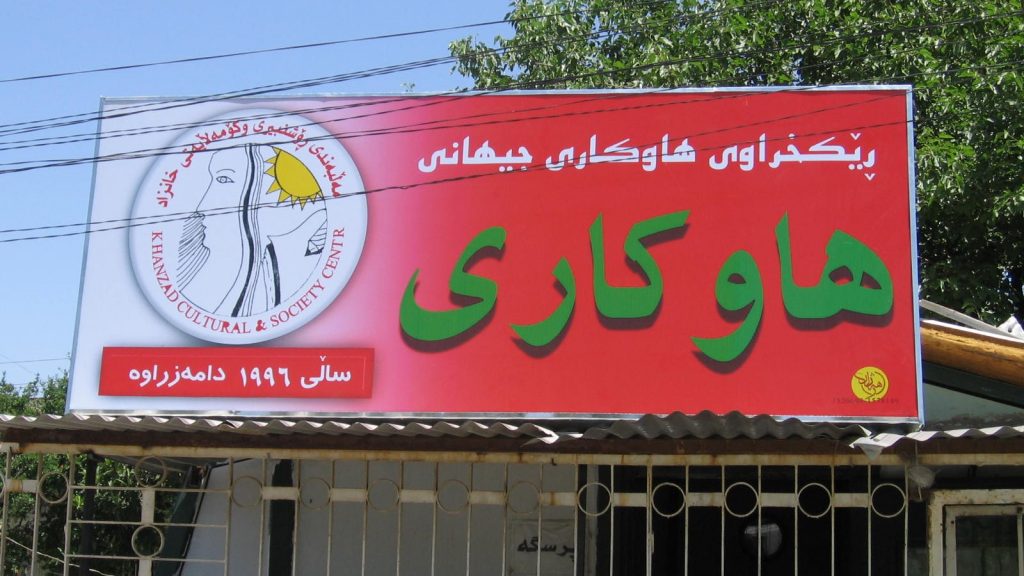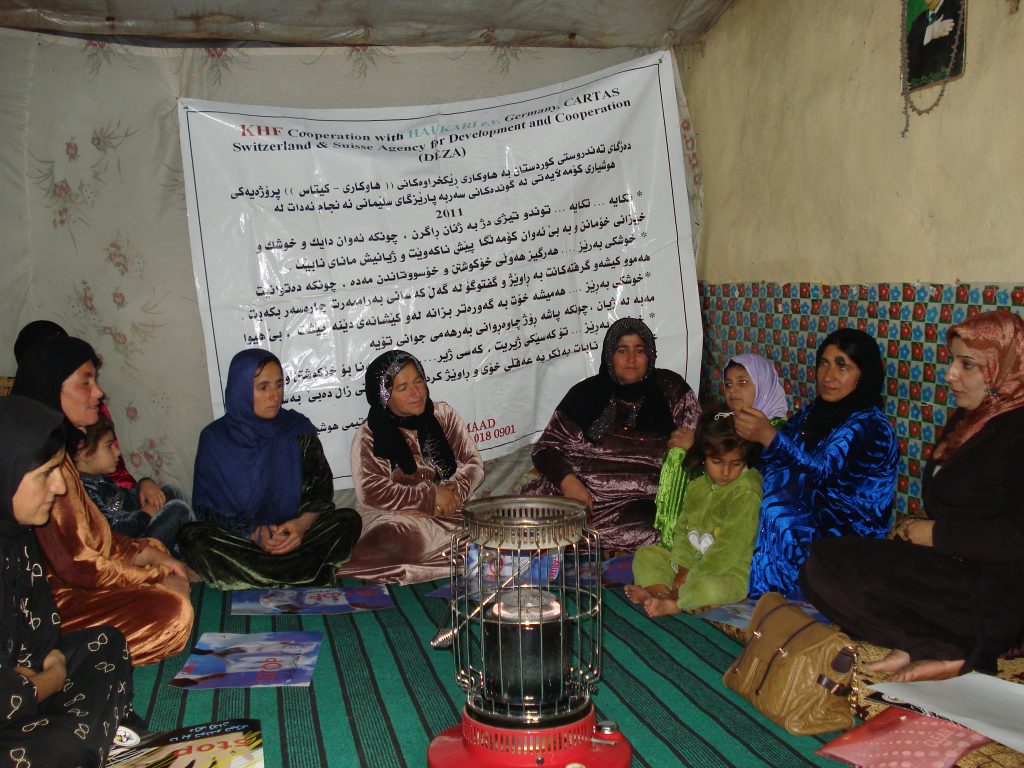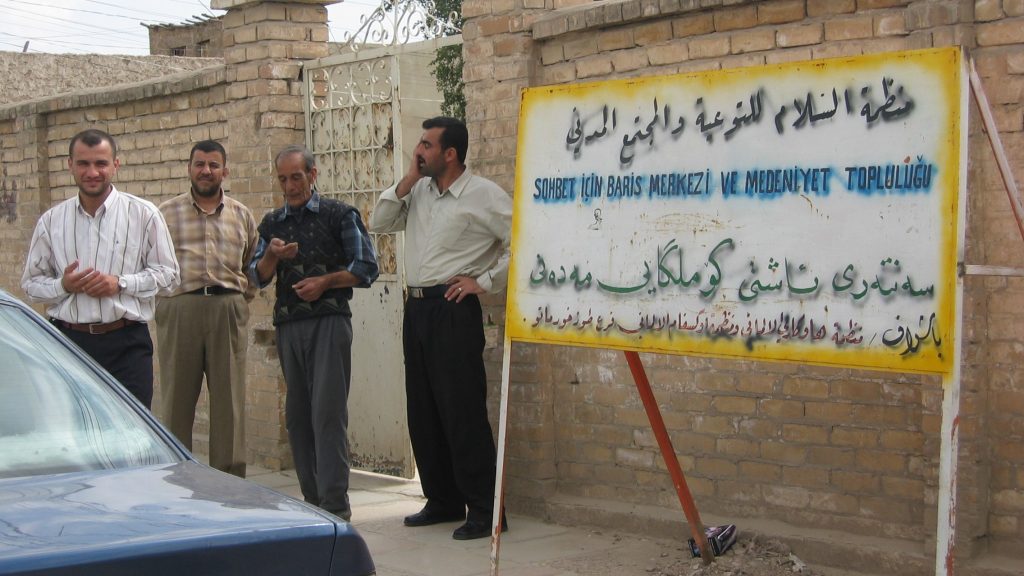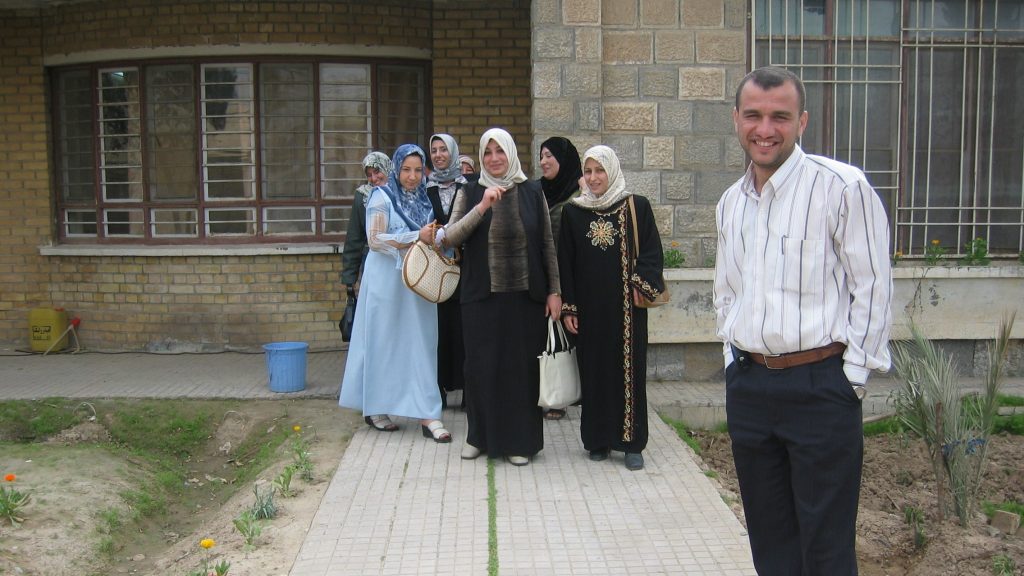About HAUKARI e.V. - Organizational History
"Haukari" means solidarity / cooperation in the Kurdish (Sorani) language.
HAUKARI – Working Group for International Cooperation – was founded in 1995 in Frankfurt/Main and is a registered non-profit association active in the fields of development cooperation and international understanding.
The Beginnings of HAUKARI e.V.
Kurdistan-Iraq, 1991: Following the first U.S.-led military intervention against Saddam Hussein’s regime, the Kurdish region achieved provisional autonomy.
This was perceded by decades of terror and persecution of Kurdish aspirations for autonomy in Iraq, culminating in the 1988 chemical weapons attack on Halabja, which killed 5,000 people, and the Anfal campaigns, in which more than 100,000 people were abducted and murdered and thousands of Kurdish villages were destroyed. Large parts of the region lay in ruins; around 2 million people fled to Iran and Turkey. The UN and international organizations supported the return of the displaced and the reconstruction of destroyed areas. The first Kurdish Regional Government was democratically elected in 1992 but not internationally recognized. For another 12 years—until the second U.S.-led invasion and the fall of the Baath regime in 2003—5 million Kurds lived in a political limbo. Reconstruction efforts were hampered by sanctions, internal political conflicts, and tensions with neighboring countries.
The later founding members of HAUKARI e.V.—Bernhard Winter, Karin Mlodoch, and Jamal Ibrahim—had been working on rural reconstruction projects in the province of Sulaimania with the German aid organization medico international since 1991.
By 1994, international interest in and engagement with Kurds in Iraq had declined significantly. HAUKARI e.V. was founded in November 1995 with the aim of providing continuous public awareness work on the situation in Kurdistan-Iraq, independent of daily politics, and of supporting civil society structures and social initiatives on the ground after decades of dictatorship. Building on existing networks and experiences, HAUKARI e.V. focused on the province of Sulaimania along the Iranian border and on underserved and infrastructurally isolated districts. Here, HAUKARI e.V. cooperated with local partner organizations, promoting projects in women’s education, health prevention, and support for survivors of political, social, and gender-based violence.

The Social and Cultural Centre for Women and Girls - KHANZAD
On May 28, 1996, the Social and Cultural Centre KHANZAD for Women and Girls, founded by HAUKARI e.V. and a group of Kurdish women, officially opened its doors in Sulaimania. The event was attended by the Minister of Culture and Religious Affairs of the Kurdish Regional Government and a wide public audience. KHANZAD was the first politically-independent centre in Sulaimania dedicated exclusively to women.
In addition to literacy, language, computer and vocational classes, the centre offered legal and social counseling, events on social and political topics, a cafeteria, a library, childcare, sports facility and a women’s driving school. Within just two weeks of opening, 1,500 women had pre-registered for courses.
Today—25 years later—KHANZAD is a key resource for women in crisis and a recognized voice in the Kurdistan Region of Iraq and in Iraq as a whole, advocating against violence and for gender justice.

Medical Counseling, Kurdistan Health Foundation (KHF)
Kurdistan Health Foundation (KHF)
Another partner from HAUKARI e.V.’s founding years is the Kurdistan Health Foundation (KHF), a group of Kurdish health professionals focused on preventive and basic medical care in rural areas. In 1998–1999, HAUKARI e.V. and KHF jointly developed a concept for the medical care of 250 Kurdish and Turkmen refugee families in a camp near Chamchamal, who had been displaced by the Iraqi regime from the Kirkuk oil region.
Other supported projects included basic health services and a study on the working conditions of women Anfal survivors in a brick factory, health outreach in villages without clinics in the Germian region, and emergency aid in refugee camps.
Support for Anfal Survivors in the Germian Region
HAUKARI e.V.’s work with Anfal survivors also began in the 1990s, initially through support of local self-help committees and the documentation of eyewitness accounts. Since then, the organization has implemented numerous projects for and with Anfal survivors, while also conducting in-depth research and publications on their situation.
Since 2009, HAUKARI e.V. has supported an initiative of female Anfal survivors in Germian to create a self-managed memorial and meeting space: the Anfal Memory Forum in Rizgary. The eyewitness testimonies collected during HAUKARI e.V.’s founding years form an important foundation of this work.
After the fall of the Baath regime in 2003, HAUKARI e.V. expanded its work to areas outside the Kurdish-administered region. Focus areas included supporting victims of political and social violence, as well as initiatives for dealing with the past and fostering interethnic and interreligious dialogue in Iraq.

As-Salam Peace Centre in Tuz Khurmatu, Salahaddin province, Iraq
In 2004, HAUKARI e.V. opened the As-Salam Peace Centre in Tuz Khurmatu, Salahaddin province, as a space for survivors of political and social violence- Arab, Turkmen, and Kurdish. The centre promoted interethnic and interreligious exchange through educational and counseling programs. Due to escalating insecurity in the area, it was forced to close in 2006.

Staff As-Salam Peace Centre in Tuz Khurmatu, Salahaddin province,
2020 - 25 Years of HAUKARI e.V.
2020 marked HAUKARI e.V.’s 25th anniversary. Over the years, the organization has accompanied its local partners through many challenges: the provisional autonomy and internal conflicts of the 1990s, the fall of the Baath regime and the fragile years of transition, the rise of ISIS, and the most recent impact of the Covid-19 pandemic.
For 25 years, HAUKARI e.V. has supported local partners, women, survivors of violence, and youth in their efforts to build a strong civil society based on democracy, gender justice, and nonviolence.
“Health is a state of complete physical, mental, and social well-being and not merely the absence of disease or infirmity. The enjoyment of the highest attainable standard of health is one of the fundamental rights of every human being without distinction of race, religion, political belief, economic or social condition.”
— World Health Organization
This quotation from the WHO Constitution was the headline of HAUKARI’s first newsletter in 1996—and lost none of its relevance during the COVID-19 pandemic.
Today, HAUKARI e.V. is one of the first signatories of the call “Patents Kill – For the Suspension of Patent Protection on All Essential Medicines,” initiated by the BUKO Pharma Campaign, medico international, Outras Palavras (Brazil), the People’s Health Movement, and the Society for International Development. The campaign advocates for global vaccine justice in response to the COVID-19 pandemic.